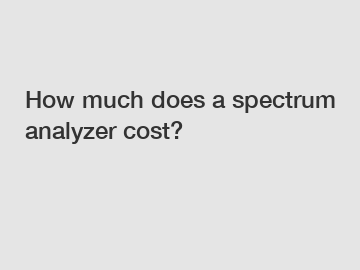How much does a spectrum analyzer cost?
In the ever-evolving world of electronics and wireless technology, spectrum analyzers are indispensable tools for professionals in various fields. Whether you're involved in radio frequency (RF) engineering, telecommunications, or even audio production, having access to accurate and efficient spectrum analysis can significantly enhance your work. However, the burning question remains: how much does a spectrum analyzer really cost? Join us as we explore the landscape of spectrum analyzers and assist you in making an informed decision based on your specific needs.
Understanding Spectrum Analyzers:
Before delving into the cost aspect, let's briefly revisit the basics. A spectrum analyzer is a vital instrument that measures the magnitude of signals in the frequency domain. It displays these measurements on a graphical representation known as a frequency spectrum, providing engineers and technicians with valuable insights into signal behavior, bandwidth, and interference.

Factors Influencing Spectrum Analyzer Costs:
When considering the cost of a spectrum analyzer, several key factors come into play. Understanding these factors will enable you to determine the right model for your requirements while keeping budget restraints in mind. Let's explore them:
1. Frequency Range: The most prominent determinant of a spectrum analyzer's cost is its frequency range. Basic models typically cover up to 3 GHz, while advanced ones go up to a staggering 110 GHz or more. As the upper limit of the frequency range increases, the cost tends to rise exponentially.
2. Frequency Resolution: The ability to resolve small frequency changes is crucial for certain applications. Higher-resolution spectrum analyzers allow for finer analysis, but they often come at a higher cost.
3. Dynamic Range: The dynamic range defines the difference between the highest and lowest power levels that a spectrum analyzer can accurately measure. A wider dynamic range generally leads to a pricier instrument due to additional circuitry requirements.
4. Application-Specific Features: Depending on your area of expertise, you may require specialized features such as real-time analysis, phase noise measurements, or modulation analysis. These extra features contribute to the overall cost of a spectrum analyzer.
Spectrum Analyzer Cost Ranges:
Now that we've identified the essential elements impacting pricing, let's explore the typical cost ranges you can expect when purchasing a spectrum analyzer:
1. Entry-Level:
Entry-level spectrum analyzers typically offer a frequency range of up to 3 GHz. These models are ideal for technicians, hobbyists, and small-scale engineering projects. Prices for these instruments range between $1,000 and $5,000, making them a cost-effective option for casual users.
2. Mid-Range:
Moving up the spectrum analyzer ladder, mid-range models usually cover a frequency range of 3-26 GHz. They provide increased performance and additional features such as higher resolution and better sensitivity. These models generally range from $5,000 to $25,000, making them suitable for professionals working in telecommunications and RF engineering.
3. High-End:
At the top of the spectrum analyzer market, you'll find high-end models with frequency ranges beyond 26 GHz. These sophisticated instruments offer advanced features, exceptional accuracy, and cutting-edge technology. High-end spectrum analyzers can cost anywhere from $25,000 to well over $100,000, catering to specialized industries like defense, aerospace, and research institutions.
Selecting the Right Spectrum Analyzer:
Choosing the right spectrum analyzer involves finding a balance between functionality, application-specific needs, and budget constraints. Consider the following questions during your selection process:
1. What is your required frequency range?
2. Do you need specialized features for your specific application?
3. Is high resolution or a wide dynamic range important?
4. What is your budget range?
By answering these questions, you can narrow down your options and select the spectrum analyzer that best fits your requirements.
Conclusion:
While the cost of a spectrum analyzer can vary greatly, it ultimately depends on the frequency range, resolution, dynamic range, and additional features required. Always prioritize your professional needs and carefully consider your budget when making a purchase decision. With the right spectrum analyzer in hand, you can ensure precise measurements, efficient troubleshooting, and enhanced performance in your field of expertise. Remember, investing in a high-quality spectrum analyzer is an investment in the accuracy and success of your work.
Want more information on Use Spectrum Analyzer, Waveform Generator, Spectrum Analyzer Rbw? Feel free to contact us.
188
0
0


Comments
All Comments (0)